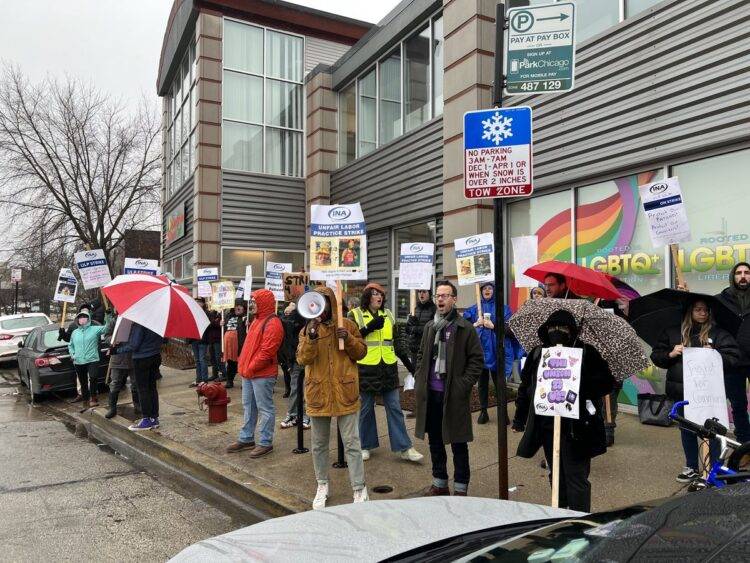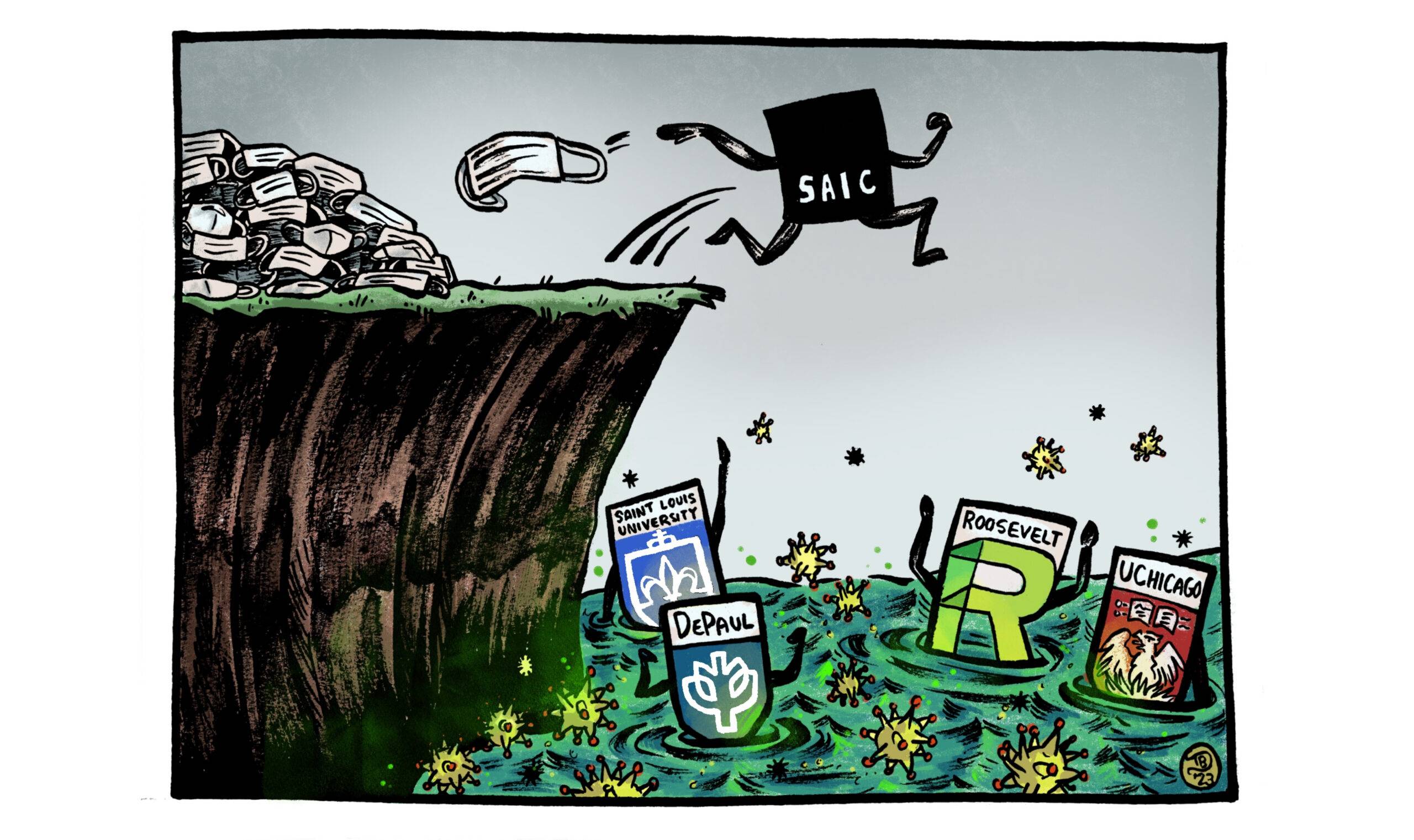
When Julian Modugno, an event planner at the Howard Brown Health Center, was laid off, he wasn’t shocked.
For the past few months, Modugno knew his position at the Health Center wasn’t secure. In November, Howard Brown management projected a $12 million shortfall for the upcoming fiscal year, claiming the staff reduction was necessary.
So when the layoffs finally arrived on Dec. 30, the news didn’t surprise Modugno who worked in the Center’s fundraising department. “I was expecting them to do this,” he said. The administration has laid off all kinds of people: those supporting the unionization of staff, those on the bargaining committee, and those who are not even supporting unionization. They are coming for anybody they want.”
For three days, from Jan. 3 to Jan. 5, Modugno participated in a strike organized by Howard Brown Health Workers United (HBHWU) – a union recently formed by the non-nursing staff members of Howard Brown Health Center. More than 400 staff gathered around the 11 locations in the North and South Side, where they protested the layoffs of 60 staff, citing it as an unfair labor practice.
Howard Brown staff joined a nationwide upsurge in the labor movement, which has seen a dramatic rise in unionization and strike activity since the COVID-19 pandemic began in 2020. Health care employees in particular – who were frontline workers during the pandemic – have been organizing against unsafe working conditions and understaffing, most recently the strike of 7,000 nurses in New York City. Their complaints of burnout, understaffing and unsafe working conditions were shared by Howard Brown workers, which impelled both nurses and the striking non-nursing staff to unionize.
The downsizing at Howard Brown Health Center poses a serious problem for the already vulnerable queer population – especially people of color– who often struggle to find a safe space where one’s health needs can be met. Furthermore, in a climate where there’s a constant attack on LGBTIQA+ health-affirming services along with the rise of queerphobic sentiments, the layoffs of staff at the health center have raised concerns among queer folks.
The disputed history of the Health Center
Established in 1974, Howard Brown Health Center is one of America’s significant health centers dedicated to queer people. At the Health Center, patients can seek various health services, including therapy, sexual and reproductive health services, psychiatric help, gender-affirming care, etc., for an affordable cost.
On its website, the center claims that it serves more than 40,000 people annually, including homeless queer people for whom it acts as a safe haven. However, the Center has also been in the news for misuse of federal research funds and a history of mismanagement..
Between 2005 to 2010, the center misspent the research funds granted by the federal government. Instead of using the grant research money for an HIV/AIDS study, it was found that the center used them for operating costs. The Center – whose future was in jeopardy because of this scandal – agreed to return $715,000 to the federal government, two years after the news of the misspending broke out.
Although things did slowly get better for the Health Center, the coronavirus outbreak in 2020 severely affected the staff and their well-being. Employees who spoke to F Newsmagazine shared that during the pandemic staff of the center risked their lives by exposing themselves to COVID-19. But instead of acknowledging the staff’s labor and contribution, Modugno claims that the management remained apathetic to them.
“Our CEO got a 33 percent raise during the pandemic,” Modugno said. “However our frontline workers who literally risked their lives weren’t paid fairly. The pandemic showed a lot of staff that management will literally work you to death and that they won’t even give you a pay bump for it.”
Cynthia McDonald, a community health worker who worked as the Ryan White Part D Medical Case Manager at the South Side clinics of the Health Center, told F Newsmagazine that many of her colleagues at the health center struggled to work with inadequate support throughout the pandemic.
“It seemed like from 2020 to 2022, I was getting a lot of goodbye emails, including from people who have been at Howard Brown for a long time,” says McDonald, who also was laid off the same day as Modugno. “Even during the height of Covid, the health workers were never really prioritized. They never got hazard pay, and PPE was sparse. It got a bit better once the Health Center received federal dollars for Covid, but the Executive Leadership Team gave themselves raises during that time,” she adds.
Data released by ProPublica, an investigative news organization, shows that the President and CEO of the Health Center, David Ernesto Munar, received a $100,000 raise during the coronavirus pandemic. This irked staff members, who told F Newsmagazine that they constantly struggle to even get a minimum raise whereas the top administrators received as much as a two-fold increase in a span of five years.
“There’s no way to get a raise at Howard Brown without getting a promotion,” said Modugno. The center is understaffed, and the staff is paid low. We don’t think that’s fair.”
The birth of Howard Brown Health Workers United

In 2019, the registered nursing staff at Howard Brown Health Center formed a union and joined hands with the Illinois Nurses Association. Until last year, the non-nursing workers at the health center didn’t have a formal union. But what they regarded as management’s lack of concern during the pandemic impelled them to form a union that could speak for them. In August 2022, Howard Brown Health Workers United was officially formed by the non-nursing staff who also picked the Illinois Nurses Association as their representative.
“We seek to form a union because we recognize that we cannot take care of the patients we serve if we ourselves are not taken care of. We seek to protect the unique culture and vision that has made Howard Brown such a special and influential place of change and healing in Chicago,” reads a statement released by (HBHWU).
After winning union recognition, members of the collective started negotiating their first contracts in early November. The rumors of mass layoffs had already spread, troubling the workers as their livelihood was at risk. So, in a bid to save jobs, the union began negotiations with the administration and organized a protest rally on Dec. 3.
“In most of the negotiations, they have been very insulting towards us,” said Modugno. Whenever we submit proposals, the administration refuses to respond. They say they are ready to work with the union, but their action says otherwise.”
Even the bargaining happened in bad faith, recalls McDonald. On the first day of negotiation, the administration gave a list of positions that they wanted to let go of. But instead of firing the staff, according to union members, the administration suggested the workers do voluntary separations.
Still, on Dec. 30, around 60 employees without prior information or advance notice were laid off from their jobs. On that day, each of them received an email – which wasn’t even addressed to them by name – stating that their position at the Center was compromised because of the financial challenges, and they couldn’t work anymore from Jan 3 onwards.
McDonald, who has been working with the Health Center for almost four years, shares that she went through a series of emotions when she found out about the layoff. “I was shocked, angry, hurt, scared, and depressed. I also felt really fearful for our patients because they rely on services like in power, behavioral health, and my position for resources that help their very lives. Management has just ignored that and has no proper plan to continue to offer these services that our patients rely on,” she says.
During the three-day strike, many current workers who weren’t laid off joined the picket line in the rain.
“This week we came together as a union and a community to show our management that we are bigger than them, stronger than them, and more compassionate than them. This has been an incredible and transformative experience for all of us and has given me the strength for the fight we still have ahead of us, both to win our colleagues’ jobs back and to win the best contract we possibly can,” Andrea Villanueva, a care specialist who has been working at Howard Brown for two and half years said.
Meanwhile, the layoffs and the strike have also received attention from members of the City Council. Alders Rossana Rodriguez-Sanchez (33rd Ward) Daniel La Spata (1st Ward), Roderick Sawyer (6th Ward), Janette Taylor (20th Ward), Byron Sigcho-Lopez (25th Ward), Carlos Ramirez-Rosa (35th Ward), Andre Vasquez (40th Ward), Matt Martin (47th Ward) and Maria Hadden (49th Ward) showed their concern by signing a letter to the Chicago Department of Public Health. In the letter, they asked the Department to respond to the unfolding crisis and made inquiries about funding the health center receives from the department.
Members of the Chicago Teachers Union, United Working Families, the Screen Actors Guild – American Federation of Television and Radio Artists (SAG-AFTRA), and American Federation of State, County and Municipal Employees (AFSCME) were joined in the picket line.
What is the union demanding?
The HBHWU stress that their first priority is to reinstate all those employees who were laid off on Dec. 30. Furthermore, the union’s goal is also to make the Center reflect on their work environment. Union members told F that they are dissatisfied with the current working conditions at the health center and are demanding changes that will make them feel valued for their labor.
“What I would like to see is more equitable services in all the clinics, a clinic on the South Side with space to work without heating, ventilation, and air conditioning issues, power outages, and brown water. I also want some respect from the leadership team and management towards their workers and patients. I want Howard Brown Health Center to actually live up to its mission statement,” McDonald wrote in an email.
How is the administration reacting?
Publicly, the administration has stated that they are ready to work with the union. In a statement released on Dec. 7, President Munar expressed that the center will be compassionate towards the staff and the union members and will bargain in good faith.
“We are working collaboratively with leaders across the agency and our union to advance compassionate plans for departing employees and continuity plans to reset teams for success in meeting patient needs. In all cases where changes may impact union members, Howard Brown will bargain with the union first and in good faith,” reads their statement.
The union alleges the Health Center has committed 19 violations of federal labor law.
“Working conditions are often unsustainable. There is severe understaffing leading to most people being extremely overworked, especially on the south side. Patients have to wait months for appointments for even simple needs. It’s a mess,” shares Villanueva.
In an email response to Windy City Times, President Munar denies the union’s allegations
“Howard Brown Health is confident that no labor laws were violated. We have not been contacted by the assigned agent of the National Labor Relations Board regarding alleged charges filed by the union. Our decision to move forward with a workforce reduction is legal and critical to address the real challenge of the unexpected revenue shortfall. Our commitment to our patients now and in the future requires us to act swiftly to stabilize the agency’s budget to provide health care services to our diverse communities,” he told Windy City Times.
Wren O’Kelley, Communication Manager at Howard Brown Health Center also told F Newsmagazine, that the downsizing of staff happened legally and was needed to solve the upcoming budgetary crisis, the Health Center is suffering from.
“As far as compensation, every single employee that separated from Howard Brown as part of the workforce reduction received a severance package,” she wrote in an email to F Newsmagazine
“When faced with the need for layoffs, cuts were made strategically to ensure that we would be able to maintain the standard and breadth of care that we’re known for. Part of this process has been understanding many places where processes have been redundant or inefficient in a way that has negatively affected our ability to deliver services. So although we may have a smaller teams, we’re taking this opportunity to reassess and reorganize how we do what we do so that we’re able to maintain and even exceed the vital care we offer to the community,” she added.
For the union members, they say that their fight against the Health Center has just started. Although there’s no guarantee that the laid-off staff will get their jobs back, union members are still hopeful that their collective effort will lead to improvements.
“Our future plans are to continue to meet with management at bargaining and also file a push for the unfair labor practices to be adjudicated. Our hope is that through this process, we can win back the jobs of everyone illegally laid off and win a fair contract,” McDonald wrote in an email.
Ankit Khadgi (MAVCS 2024) is a Nepali queer storyteller based in Chicago. He hates people who eat momo with ketchup and mayonnaise and drink Chai Tea.







